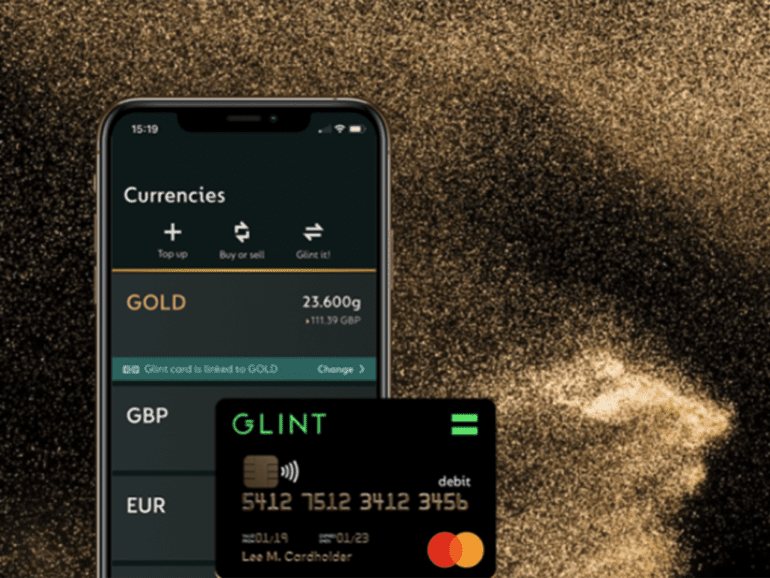Meet Glint, a British fintech with an app and debit card that enables users to save, exchange, and spend in physical gold and multiple currencies.
The company was founded in 2015 by Jason Cozens.
“Glint is not a bank nor a crypto-currency but takes a different approach to the problems surrounding money’s decreasing purchasing power and systemic risks,” Cozens said.
Glint has raised £28.5 million ($37.5 million) in funding over six rounds. Lead investors include Sprott Asset Management, Venture Labo Investment, Tokyo Commodity Exchange, and Bray Capital.
So why gold?
Humans have always intuitively placed a high value on gold, but the high costs of refining, inspecting, storing, and insuring gold have prevented most small investors from owning physical gold.
This fact, combined with the move away from centralized distributed ledgers, has created the space for consumers to consider that it may be time to ‘glint it.’
Inflation driving push
But the main reason is inflation.
“In my lifetime, the US Dollar and British Pound have lost around 85% of their purchasing power. In contrast, while we recognize that the value of gold can fall, which means the purchasing power of the customer can also fall, we can see that the purchasing power of gold has increased by more than 500% in the same period,” Cozens said.

The price of gold increases to balance the inflationary consequences and maintain a stable purchasing power in times of global uncertainty, so many investors retreat to gold as an alternative to paper currency.
In modern financial history, there have been waves of spikes and crashes, which speaks to the increasingly volatile nature of the financial market, which more and more investors fear.
Most notably, the United States real estate bubble (2008) and the associated outbreak of the Eurozone sovereign debt crisis (2010), the global economy is still not fully recovered.
To add to the mix, the geopolitical uncertainties of BREXIT, the Ukraine Crisis, sharp rises in energy, and the economic effects of COVID-19 have added to the skepticism.
The Bank of England reports that the inflation rate in the UK has risen to 5.5% in the 12 months to January 2022, with predictions that it will soar to 8% this spring which would be a 30-year high.
For Glint, this reconfirms its need to exist. Within this same period where inflation has risen, they have seen a 30% increase in gold purchases from their existing clients and hit a new milestone of 100,000 registered users last week.
According to The World Gold Council (WGC), the investment demand for gold worldwide has grown 15% per year since 2001. During 2020, global investment demand rose 40% to a record annual high of 1,773.8 tons.
So does gold matter?
“We now have the opportunity, the capability, and the finances to create a gold-based echo-system connected to but outside the banking system,” Cozens adds.
The need for a viable alternative remains, especially since, according to a recent Ernest & Young report 2021, 37% of consumers now name fintech as their most trusted brand of financial services, compared with 33% who name banks as the most trusted and 12% who say wealth management firms.
COVID-19 seems to have accelerated the erosion of trust, as a physical presence, a traditional advantage for traditional incumbent banks, has become less meaningful.
Fintech and big tech companies benefit most from the loss of trust due to their agile strategies, decentralization, and innovative business models, which have gained acceptance.
However, the rise in inflation, geopolitical uncertainty, and energy prices justifies investing in crypto, so does gold matter?
“Crypto can give some big gains, but also huge losses. Its volatility isn’t for the faint-hearted. Gold is steady. It’s not about getting rich quick, but about maintaining its value against fiat currencies,” Cozens said.
For Glint, it is not an either-or, but the reasons above demonstrate that consumers need to diversify their investment portfolio and have money in both crypto and gold.
“There is room for both crypto and gold,” he said.
However, one might wonder if there is a long-term need for Glint. What happens if inflation decreases? Many investors see gold as something with limited use, mainly for jewelry, frightened individuals, or speculators.
‘Our existence isn’t based on fear’
“Our existence isn’t based on fear; there will always be a need for all of us to save and protect our hard-earned money, even in the good times,” Cozens added.
Long term, Glint plans to create a gold-based echo-system connected to but outside of the banking system, where they can bring Glint’s vision of a world where everyone has the opportunity to prosper to life.


